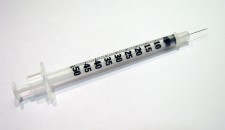 The drug company, Regeneron, which specializes in biologicals (drugs made utilizing biological systems, such as antibodies, rather than synthesized chemicals), released results of a late-stage trial of their new man-made antibody, alirocumab. (Hopefully the brand name will roll off the tongue with a bit more fluidity).
The drug company, Regeneron, which specializes in biologicals (drugs made utilizing biological systems, such as antibodies, rather than synthesized chemicals), released results of a late-stage trial of their new man-made antibody, alirocumab. (Hopefully the brand name will roll off the tongue with a bit more fluidity).
The drug, being an antibody, cannot be effectively absorbed from the GI tract, so it is injected every 2 weeks. The mechanism of action involves a complex sequence, wherein the drug blocks a protein that reduces the elimination of LDL-cholesterol (the bad cholesterol) from the bloodstream resulting in higher elimination rates of the LDL There are other drugs with a similar mechanism in late-stage trials conducted by other pharmaceutical companies with expertise in biologicals. This class of drugs is known as PCSK9 inhibitors, and keep an eye out for numerous similar studies and possibly FDA approvals over the next few years. One such study, which combined this drug with a statin, cut LDL by 70 percent.
The current study, conducted by Regeneron and Sanofi, compared the response to alirocumab with that among patients taking Zetia (ezetimibe), the entire group numbering 103 people. The study subjects LDL levels were reduced by 47 percent compared to the Zetia group s 15.6 percent. And to cap off this good news, there were no significant side effects seen, and (according to the drug company spokesman) this is similar to earlier studies.
ACSH s Dr. Gilbert Ross had this perspective: Although this is a clinical trial, and a small one at that, given the extent of the cholesterol problem in our country and the developed world, any advance in reducing LDL must be considered highly important. Some might say, Well, we have all those statins and other drugs as well which seem to be doing a good job, and CAD rates have come down. I d respond by noting that many many people whose cholesterol, HDL and LDL levels or other co-morbidities would warrant treatment are not getting it, for various reasons. This new drug must be given every 2 weeks by injection; while this sounds like a downer, in fact for those intolerant to or unresponsive to other therapies, including statins, this is a small price to pay for major impact upon lowering their CAD risk. We look forward to larger studies.


